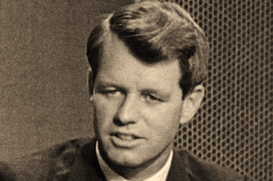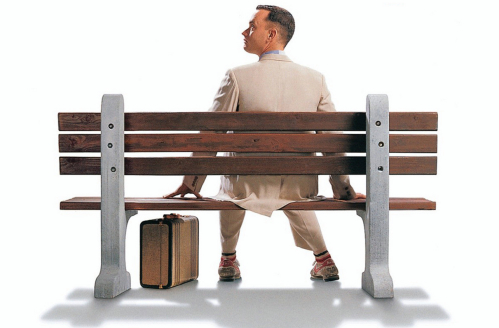To Fit Our Notions
|
Having taught history for many years, one of the things that rattles me is how some people will rewrite history either to fit their mindset or simply out of ignorance. Therefore, this is my effort at an online class for my readers. I will discuss three issues that are major rewritings of history: In God We Trust, strict constructionism, and States' rights. The phrase, In God We Trust, is used in many areas of our society. Many states use it as a slogan on license plates. This is one from Indiana. 
In God We Trust The phrase is also used by those attempting to provide an ethical foundation to their personal and/or ethical beliefs. This is done with the assumption that their beliefs are in accord with the beliefs of our Founding Fathers. Therefore, let us look at what the Founding Fathers of our nation thought about when they thought about God. They were divided into three general groups. The largest group was those with a Judeo-Christian tradition but were more deeply influenced by Deism. Deism was based upon the writings of John Lock, Jean-Jacques Rousseau, and Isaac Newton who used reason and science and not religious dogma to explain the world. Deists believed that some deity created the universe and simply left its creation alone. Natural laws affected the world, not some divine intervention. Deism was developed first by philosophers like Heraclitus, Plato, and Aristotle in ancient Greece. Aristotle came up with his notion of god as the unmoved-mover, which was essentially the basis of natural law. Additionally, this first group of the Founding Fathers didn't accept things like miracles or the divinity of Christ. John Adams, Benjamin Franklin, James Monroe, George Washington, and Thomas Jefferson were some from this first group. For example, some think of Washington as a deeply religious person. They envision this in this painting of him praying prior to the battle at Valley Forge. It did not occur. Washington believed in Providence, which was based upon Deism. Providence was closer to natural law than his Anglican background would have been comfortable. 
Washington didn't pray in the snows prior to the battle of Valley Forge. This painting was done by Arnold Friberg in 1975. He painted patriotic scenes especially having to do with religion. Washington was born an Anglican, who blended Deism and used some nominal Judeo-Christian terminology. Regardless of this painting, this group of our Founding Fathers were not into some deity intervening in our lives or in the world. John Adams had more anti-traditional Christian beliefs. For example, he rejected both the divinity of Christ and the Trinity. When he signed the Treaty of Tripoli, he stated that the "government of the United States of America is not in any sense founded on the Christian Religion." Thomas Jefferson dissed the Old Testament completely and edited the entire New Testament. What Jefferson did was to delete sections that he dismissed by literally cutting them out of the New Testament text. 
Jefferson did not buy things like miracles, resurrection, divinity of Jesus, the virgin birth, and original sin. Regarding the First Amendment to the Constitution, he wrote that the Constitution erects a "wall of separation between church and state." Jefferson spelled out this separation to the Danbury Baptist in a letter sent in 1802. Benjamin Franklin rejected "that the Almighty ever did communicate anything to man, by...speech,...language, or...vision." He totally dissed that entire notion. The first group was the largest, which accepted Deism. They merely added to Deism some Judeo-Christians terms or phrases. This merely was a means to define their Deist beliefs by using some terms that all would understand. The second group were the pure Deists. People like James Madison, Thomas Paine, and Ethan Allen. Madison was categorically opposed to the government paying for chaplains in both the military and in Congress. He objected to recording a person's religious views on the census. Madison saw any mixing of church and state as strictly unconstitutional. Thomas Paine wrote in The Age of Reason that Christianity was anti-rational. He dissed the Old Testament completely and rejected, like Jefferson, all miracles, prophecies, and divinity of Jesus in the New Testament. This is Paine's statement of faith about Deism, which views God as a cosmic clockmaker who wound up the universe and left it alone. "I believe in one God, and no more; and I hope for happiness beyond this life. I believe in the equality of man; and I believe that religious duties consist in doing justice, loving mercy, and in endeavoring to make our fellow-creatures happy." Finally, the last group would be people like Patrick Henry, Samuel Adams, and John Jay, who were Christians without any beliefs in Deism. It is obvious that many people's understanding today of history doesn't gel with the actual history. These true believers buy into the notion that our country was based upon divine guidance. This mistaken notion of In God We Trust has been carried on with the notion of Manifest Destiny a century later. 
The next rewrite of history has to do with strict constructionism or federalism. Anton Scalia was, until he died, the architype of methodology. 
This group wished to go back to the Constitution when deciding a case before the Supreme Court and any lower court. If the issue is not spelled out in the Constitution, that fact determines how they will view the case. Scalia said, "It's what did the words mean to the people who ratified the Bill of Rights or who ratified the Constitution." That statement reflected Scalia's time of the Court; only two former justices dissented more than he did. Interestingly, he was proud of that fact. To clarify Scalia's position against gay rights, he said, "And the Supreme Court said, 'Yes, it is unconstitutional.' On the basis of - I don't know, the Sexual Preference Clause of the Bill of Rights, presumably." While that seemed a strange means for a justice to address issues in the 21st century, the notion that our society hasn't changed over two centuries seems odd. The other issue that troubles me regarding the Supreme Court is that the Constitution, the Bill of Rights, and other Supreme Court decisions are infallible. Women couldn't vote until 1920. Why? Sexism. Scalia would have said that it was not in the Constitution. Roe v. Wade is a decision that Scalia wanted to reverse. The question should be why. Scalia had issues regarding abortion. However, I wonder whether, if he had been a woman, he would have thought differently about men deciding what happens in a woman's body. In addition, it reflected his religious beliefs about when life starts even though Jefferson, who wrote the Constitution, said that there is a "wall of separation between church and state." Scalia had issues with any change. For example, when Vatican II attempted to update the Mass, Scalia drove to parishes farther away from his home that still used Latin during the Mass. The Dred Scott decision was blatant racism coming from the Court. That decision by the Supreme Court is considered the worst decision that they ever made. However, a similar one was the Korematsu decision regarding Japanese internment camps during WWII. Again, the basis of the decision was racism. Interestingly, Bob Dylan during the civil rights movement in the 60s wrote, The Times are A-Changin'. Scalia and the strict constructionists should have listened and thought about the changes a half century ago.
The third rewrite of history has to do with States' rights. Bobby Kennedy addressed this issue. Kennedy gave the history of States' rights, which was not what the Founding Fathers wrote about over two centuries ago.
Kennedy is addressing the Tenth Amendment to the Bill of Rights, which reads, "The powers not delegated to the United States by the Constitution, nor prohibited by it to the States, are reserved to the States respectively, or to the people." The Tenth Amendment is a single sentence and quite easy to understand. States have rights. However, those rights can't be in violation of the Constitution of the United States. This harkens back to Scalia. The Tenth Amendment doesn't give the States rights that supersede that of the Constitution. However, those who are into States' rights miss that provision about the States trump the Federal government's rights for all Americans. The Constitution did not provide human rights to some States without giving them to all States. 
Kennedy saw the term to be code word for various forms of discrimination. In his time and even in the present day, States' rights means racism. Saying States have the right to decide issues like race at the State or local level is unconstitutional. In conclusion, one of the strange blessings of having danced with death is that one is far more keenly aware of their mortality. We all think that we understand our mortality. As for the intellectual concept, we get that. However, unless you have danced with death, you can't understand that reality in your gut. I have done the dance twice. Because of that, I'm not wasting the time that I still have remaining. I am still teaching classes at college. I still write about concerns that I have. I also understand that what I believe is being observed by family and friends. When I die, my three children and three grandchildren will divide up what money I have along with the things that I have collected over my lifetime. Nonetheless, the critically important legacy has to do with helping others as they live their lives. That example is more important than any monetary sum. This essay has been about me. I hate to tell you, but you also are not immortal. What financial legacy you will leave your family is not as important as the legacy that you leave them in what you believe or about which you care. Think seriously about that legacy before it is too late.
Visit the Bobby Kennedy page to read more about this topic.
Visit the Music I Love and Why page to read more about this topic.
Visit The Mentors and Me page to read more about this topic.
Forrest Gump, "Stupid is as stupid does." Visit the Stupid is As Stupid Does page to read more about this topic. 04/22/16 Follow @mountain_and_me |










